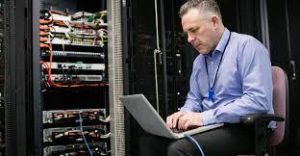The Prudent Choice: Why Outsourcing Trumps In-House Server Rooms
 Running an in-house server room within your business may seem like a logical approach, but a closer examination reveals a myriad of potential drawbacks. The foremost among these is the substantial cost associated with maintaining and operating server equipment, especially when compared to the cost-effective hosting services available in Los Angeles. Servers demand dedicated cooling, power, and space, expenses that can rapidly escalate. Contrarily, opting for professional hosting services not only mitigates these costs but also provides a more streamlined and efficient solution.
Running an in-house server room within your business may seem like a logical approach, but a closer examination reveals a myriad of potential drawbacks. The foremost among these is the substantial cost associated with maintaining and operating server equipment, especially when compared to the cost-effective hosting services available in Los Angeles. Servers demand dedicated cooling, power, and space, expenses that can rapidly escalate. Contrarily, opting for professional hosting services not only mitigates these costs but also provides a more streamlined and efficient solution.
A critical disadvantage of maintaining a server room lies in the inherent security risks it poses. The potential ramifications of unauthorized access to your network infrastructure are profound, ranging from theft to the malicious manipulation or destruction of sensitive data. Moreover, the concentrated flow of substantial traffic through a single point increases the susceptibility of your business to Denial of Service (DoS) attacks, posing a significant threat to operational continuity and data integrity.
Another limiting factor associated with in-house server rooms is their physical constraints. The capacity of a typical server room is finite, often inadequate for larger businesses grappling with extensive data requirements. Scaling up by adding more servers becomes a logistical challenge, necessitating additional space and cooling capacity—an economically burdensome prospect in most scenarios.
Furthermore, the geographical placement of server rooms, typically in remote areas detached from employee workspaces, introduces inefficiencies. The increased distances between staff and their technology infrastructure translate to longer travel times, potentially impacting overall productivity and responsiveness.
To strike an optimal balance between advantages and disadvantages, organizations must conscientiously evaluate the feasibility of maintaining an in-house server infrastructure versus leveraging external data center solutions. The advantages of outsourcing to a company like Electric Kitten, including cost-effectiveness, enhanced security measures, and scalability, make it a compelling choice for businesses seeking to optimize their technological operations. By embracing professional hosting services, companies can redirect resources towards core business activities, ensure robust security protocols, and seamlessly adapt to evolving technological demands, thereby fostering sustained growth and competitiveness.
